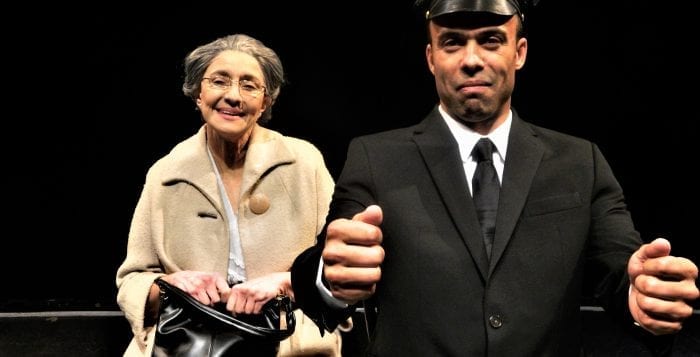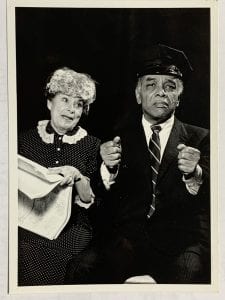Theatre Talk with Antoine Jones

By Melissa Arnold
For many people, it can be challenging to get to know someone of a different culture or background. This was especially true in the decades leading up to the civil rights movement, when expected social roles, biases and assumptions were commonplace. Playwright Alfred Uhry presented this struggle in his classic drama, “Driving Miss Daisy.” The show begins in 1948 in Georgia and chronicles more than 20 years in the life of Hoke Coleburn, a genteel and optimistic black chauffeur, and his client, a standoffish Southern Jewish woman named Daisy Werthan.
The Pulitzer Prize-winning play is set to open at Theatre Three on Jan. 11. Directed by Linda May, it co-stars Phyllis March as Daisy, Steve Ayle as Daisy’s son Boolie and Antoine Jones as Hoke, a role his father Al Jones played on the same stage 25 years ago.
The 41-year-old actor has enjoyed a successful career in professional theater, following in the footsteps of his siblings and his late father. Since returning to Long Island a few years ago, the Setauket resident has become a familiar presence onstage at the Port Jefferson theater.
When did you first get involved with Theatre Three?
I did my first show for Theatre Three when I was a child -− it was a production of “The Pied Piper” and then when I was a teenager I was in “Joseph and the Amazing Technicolor Dreamcoat.”
Did you ever aspire to play Hoke?

I never saw that for myself, no. I am about 20 years too young for the role, and that was a concern. Beyond that, I saw my father perform in this role for two separate productions, and during rehearsals there were moments where I had to stop and consider if I was acting or simply recreating what my father had presented. He was effortless. The character and this part of history were both very special to him as a man that was born in the late 1920s. He knew personally and deeply what “Driving Miss Daisy” was trying to accomplish. To stand on the stage he stood on 25 years later is a singular experience.
Was it intimidating to step into the role knowing your father also played Hoke?
It would be one thing if this was just a role that my father played, and I waxed and waned between missing him and being sad that I don’t get to see him perform again. But I also have a broad background in African American studies, both from college and just in life, and the continuing relevance of “Driving Miss Daisy” is something I don’t take lightly. And I’m working with two other people that also understand their role. Legendary actors that most people are familiar with have played the role of Hoke, and there is an expectation that you better be able to do it.
How do you like working with the rest of the cast?
Phyllis March and Steve Ayle both have a long history at Theatre Three. They’ve been there for many years and are really part of the theater’s legacy. We are not the type of people who do theater just to make these sporadic connections that come and go. These are very earnest people with busy lives and jobs − Steve runs his own business. They came to do these roles because it means something to them to commit, do hard work, and give people something they can walk away with that’s more than just entertainment. It’s a gift to work with such hardworking people.
What do you enjoy most about the play?
We’ve spent a lot of time in rehearsals talking about who the characters are and where they’ve come from and how they got here. One of the greatest aspects of the play is that you don’t get the low-hanging fruit.
Alfred Uhry has written a play that presents complicated people. It reveals a racism that isn’t mean-spirited or easy to identify. These are essentially good people who, whether through nurture, nature or a lack of exposure, are forced to realize that maybe they aren’t quite where they need to be. I think that’s where most of us are, and I think that’s the brilliance of the play.
Daisy Werthan isn’t a racist, but as far as Hoke is concerned, she’s got a long way to go. Even Hoke himself is a product of structural racism, and he talks about it. He doesn’t like the Creole people because he feels like they don’t strive for education or to move off their land, but he doesn’t understand that they’re just as much victims of racism and the lasting effects of slavery as he is. We talk a lot about that, and the gift is that we get to expose that nuance.
Do you have a favorite scene?
My favorite scene for Hoke is when Daisy learns that her synagogue is bombed. To sympathize with her, Hoke reveals something deeply personal that affected him in a profound way. It’s meaningful because it gives a clue about how Hoke got to where he is now, He’s had a lot of profound experiences that he needs to keep close to the vest, but that isn’t something Daisy has experienced.
Do you identify at all with Hoke’s personality or experiences?
I don’t know that I can identify. One of my problems is that Hoke can’t simply turn around and say, “This is a problem that I’m having, and I want to address what’s going on so I can feel like I’m in a more productive, positive place in the future.” He doesn’t have the words or the power. He isn’t even allowed to be frustrated. The humanity of the play constantly keeps us in check.
What of yourself have you brought to the role?
I don’t know how to answer that, but the director, Linda May, has a very unique perspective because she’s also an actor. She’s able to move us along in a way that is actor logic. She’s put some difficult observations in front of us. One of mine was that my voice would tend to rise in pitch, and she would tell me to bring it down because it didn’t sound grounded. It was like I was a slave-type character with no spine. I have to work very hard in my own mind to not think, “This feels too simple.” Not everything is Shakespeare or has that kind of depth. If you want to see bits of my personality, maybe you’ll find them if you see the show, I don’t know.
Why do you think ‘Driving Miss Daisy’ has been so successful over the years?
I think part of why Daisy Werthan and Hoke Coleburn are so lovable as characters is because when the show begins, they couldn’t do anything about the circumstances they were in and had been born into. But by the end of the show, both of them have made a tremendous arc that many people in their situations wouldn’t have accomplished. Many Jewish women had black hired help and there was no evolution to their relationships. And someone like Hoke would have never had an opportunity to develop friendships with the people they worked for.
Daisy and Hoke have a spirit within them − Daisy being hard and inflexible, Hoke being this bundle of positivity that wants to get along − and they managed to change when so much in their world was terrible. They were able to see great things in each other, and sometimes that’s the hardest thing to do. We label each other and put them in categories and we don’t have to think about them again … but through sheer force of will, they overcome.
Why should people come see this show?
Alfred Uhry has written a timeless, celebrated and well-performed 90-minute slice of history. It’s a great writing that shows people don’t have to be perfect as long as they keep trying, and it’s when we stop listening to one another that things get messy. It shows that people are at their best when they listen.
“Driving Miss Daisy” will run from Jan. 11 through Feb. 1 at Theatre Three, 412 Main St., Port Jefferson. Tickets range from $20 to $35. To learn more or to purchase tickets, visit www.theatrethree.com or call 631-928-9100.






